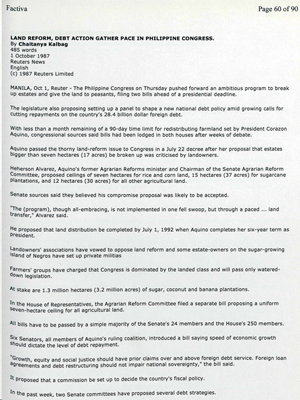LAND REFORM, DEBT ACTION GATHER PACE IN PHILIPPINE CONGRESS
[Reuters]
Published date: 1st Oct 1987
1 October 1987
Reuters News
English
(c) 1987 Reuters Limited
MANILA, Oct 1, Reuter – The Philippine Congress on Thursday pushed forward an ambitious program to break up estates and give the land to peasants, filing two bills ahead of a presidential deadline.
The legislature also proposing setting up a panel to shape a new national debt policy amid growing calls for cutting repayments on the country’s 28.4 billion dollar foreign debt.
With less than a month remaining of a 90-day time limit for redistributing farmland set by President Corazon Aquino, congressional sources said bills had been lodged in both houses after weeks of debate.
Aquino passed the thorny land-reform issue to Congress in a July 22 decree after her proposal that estate bigger than seven hectares (17 acres) be broken up was criticised by landowners
Heherson Alvarez, Aquino’s former Agrarian Reforms minister and Chairman of the Senate Agrarian Reform Committee, proposed ceilings of seven hectares for rice and corn land, 15 hectares (37 acres) for sugarcane plantations, and 12 hectares (30 acres) for all other agricultural land.
Senate sources said they believed his compromise proposal was likely to be accepted.
“The (program), though all-embracing, is not implemented in one fell swoop, but through a paced … land transfer,” Alvarez said.
He proposed that land distribution be completed by July 1, 1992 when Aquino completes her six-year term as president.
Landowners’ associations have vowed to oppose land reform and some estate-owners on the sugar-growing island of Negros have set up private militias.
Farmers’ groups have charged that Congress is dominated by the landed class and will pass only watered- down legislation.
At stake are 1.3 million hectares (3.2 million acres) of sugar, coconut and banana plantations.
In the House of Representatives, the Agrarian Reform Committee filed a separate bill proposing a uniform seven-hectare ceiling for all agricultural land.
All bills have to be passed by a simple majority of the Senate’s 24 members and the House’s 250 members.
Six Senators, all members of Aquino’s ruling coalition, introduced a bill saying speed of economic growth
should dictate the level of debt repayment.
“Growth, equity and social justice should have prior claims over and above foreign debt service. Foreign loan agreements and debt restructuring should not impair national sovereignty,” the bill said.
It proposed that a commission be set up to decide the country’s fiscal policy.
In the past week, two Senate committees have proposed several debt strategies.
They include a celling on repayments of 15 per cent of annual foreign exchange receipts, the setting up of a new debt negotiating panel headed by a diplomat, and the repudiation of some loans incurred by former President Ferdinand Marcos that may have been acquired fraudently.
Bankers say they fear the proposals are pushing the Philippines towards a risky confrontation with its creditors.
Retaliation could include lawsuits, attachment of Philippine assets abroad, and a cut-off of trade credits that help finance the country’s Imports.
“Importers will stop buying Philippine goods because they are liable to be seized by a creditor bank,” the banker said.
“Banks will (urge) their governments to cut off trade preferences for Philippine products. Even a Philippine Airlines plane landing in New York will be liable for seizure,” he added.
Reuter photo Philippines brokers answering telephones






